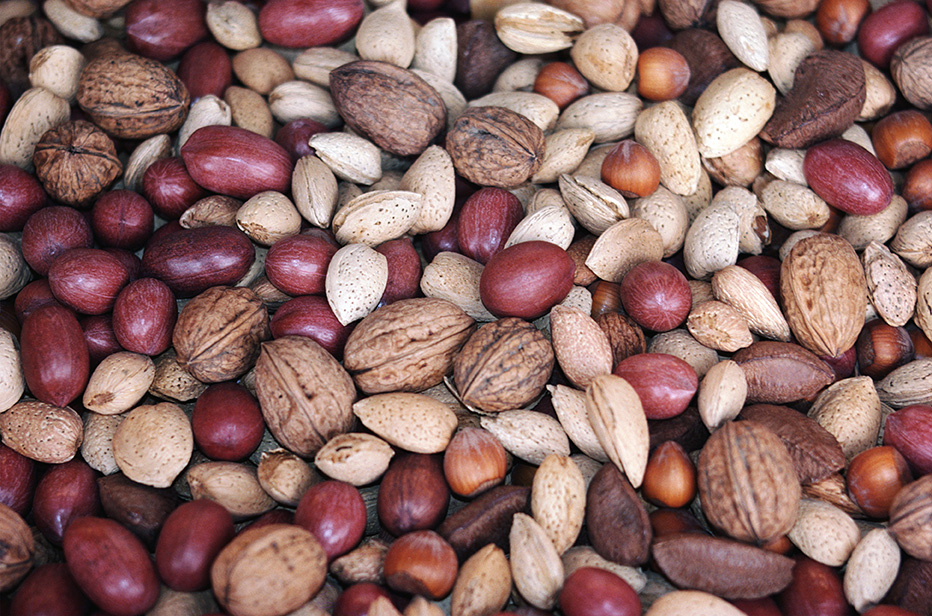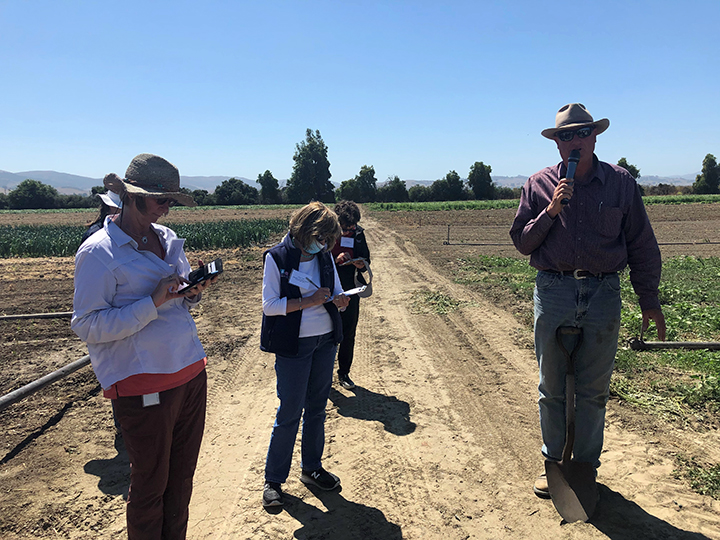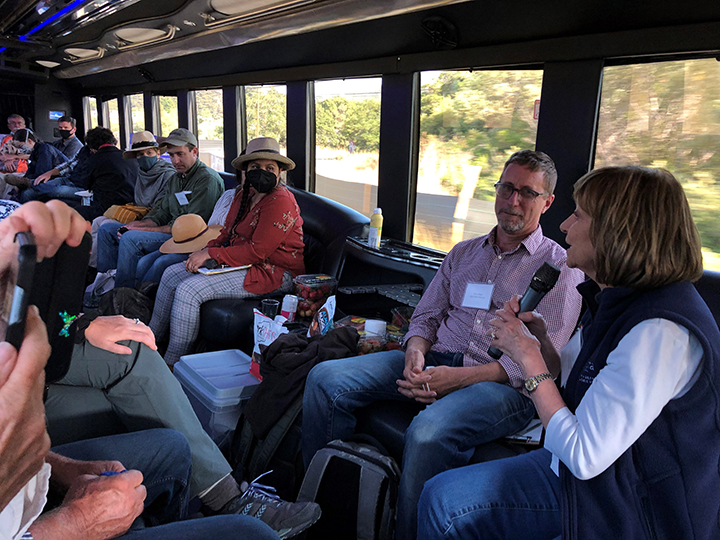Video in Spanish
Visit this link for a list of Certified Farmers’ Markets in California.

From a USDA News Release
The U.S. Department of Agriculture (USDA) is investing $15 million for a new drought pilot to assist agricultural producers impacted by worsening drought conditions in the Klamath River Basin. The announcement comes as U.S. Secretary of Agriculture will travel to the state for events focused on drought and wildfire resiliency on Tuesday.
“As ongoing drought conditions in the West continue to worsen, we need to find ways to do things differently in order to provide help and assistance to producers, Tribes, and communities,” said Gloria Montaño Greene, USDA’s Deputy Under Secretary for Farm Production and Conservation. “We recognize that current USDA programs and services are not enough to meet this historic challenge, and this pilot will help us find more tools to add to our toolbox.”
The Klamath Project’s “A” Canal will remain closed this year because of a lack of water supply. The canal, a major component of the Klamath Project, typically provides access to Upper Klamath Lake, supplying water for over 200,000 acres of farmland.
The block grant to the Klamath River Drought Response Agency (Klamath DRA) will provide payments to producers to reduce irrigation demand. This will assist in allowing the limited supply of water to be used for other practices that are vital to the region’s food supply and to reduce adverse impacts to producers in the region and supply and distribution chains. Producers will apply for funding through the Klamath DRA.
USDA will evaluate the outcomes to help inform future program design and will continue to monitor basins and drought conditions to determine where additional may best provide immediate economic support and relief to producers.
Additional Drought Assistance
The pilot is part of a broader suite of programs available to producers to help recover losses from drought. Disaster assistance programs and loans are available to help producers offset losses and get financing to help with recovery. Producers should visit farmers.gov, where they can use the Disaster Assistance Discovery Tool or Disaster-at-a-Glance fact sheet to learn more about program or loan options.
Drought Coordination
USDA is coordinating with federal agencies, state governments, Tribes, and others to address the impacts of drought. This includes a new interagency working group created in April by the Biden-Harris Administration’s National Climate Task Force to address the worsening drought conditions in the West and support farmers. USDA co-chairs the task force with the Department of Interior.
“Drought significantly impacts agriculture, and the ability for farmers and ranchers to help transform water into food and fiber for our nation,” Montaño said. “USDA is partnering with an array of groups for a government-wide approach to addressing drought.

The California Department of Food and Agriculture’s Plant Health and Pest Prevention Services Division is releasing the 2021 Navel Orangeworm Program Survey to growers.
The survey addresses the development of new tools to detect and control navel orangeworm in tree nut crops, including sterile insect technique (SIT), which is an environmentally-friendly pest control method involving the mass-rearing and sterilization of a target pest, followed by the systematic area-wide release of sterile males by air over defined areas, where they mate with wild females resulting in no offspring and a declining pest population..
California’s climate, with warmer winters and longer growing seasons, increases winter survival of the navel orangeworm. This pest has a wide host-range and high dispersal capability. Current control methods can cost more than $400 per acre, yet can still result in unacceptable levels of damage.
The Navel Orangeworm Program is a cooperative effort between the U.S. Department of Agriculture, CDFA, and the California tree nut industry.
The survey can be accessed by clicking here.
The USDA Beginning Farmer and Rancher Initiative and the USDA Farm Service Agency are collaborating with the California Department of Food and Agriculture (CDFA) and regional partners to offer three regional workshops to support underserved farmers and ranchers by providing essential business-building resources.
Sacramento: Tuesday, August 24, 2021
Sacramento County Farm Bureau
2600 River Plaza Dr.
Sacramento, CA 95833
9:00am to 1:00pm
Fresno: Wednesday, August 25, 2021
Fresno County Farm Bureau
1274 W Hedges Ave,
Fresno, CA 937281
9:00am to 1:00pm
Bakersfield: Friday, August 27, 2021
University of La Verne, Bakersfield
10800 Stockdale Hwy,
Bakersfield, CA 93311
9:00am to 1:00pm
To RSVP or for further information, contact:
Yolanda Randles at yrandles@wfresnofrc.org
Brooke Raffaele at brooke.raffaele@usda.gov
Victor M. Hernandez at victor.hernandez@ca.usda.gov
The events will be held both on-site and virtually, through Microsoft Teams. Click here to join the meeting once it has begun. The schedule for each of the three sessions is as follows:
9:00am to 11:00am PST (virtual)
9:00am to 1:00pm PST (in-person)
The three workshops will build on one another and consist of an overview of the ‘Growing Together’ Black Farmer Conference with Urban Farmers set for October 22, 2021 in Fresno, followed by panel discussions: CDFA, USDA and other partners will discuss available resources and grant programs. During the second part of the day, business partners will be available for one-on-one business advising to farmers and ranchers who attend. The workshops have been developed for sharing business insight and industry trade advice while highlighting resources for new and beginning farmers and ranchers, for building business acumen and moving toward access to capital.
Black farmers and urban farmers are under-represented in government program participation, so USDA and CDFA’s Office of Equity are working with a community of support organizations to make a concerted effort to create awareness of USDA Farm Production and Conservation agency resources for farmers & ranchers in California. Supporting organizations include: California Farm Bureau, West Fresno Family Resource Center and University of La Verne present: U.S. Small Business Administration, SCORE Mentors, and Mission Community Service Center with Kern County Women Business Center.
A webinar series hosted by the California Farm Bureau Federation in partnership with the Monterey County Farm Bureau and the California Department of Food and Agriculture (CDFA) about best food safety practices for agricultural neighbors is now available online. The recordings include members of the California Agricultural Neighbors (CAN) group discussing the CAN interim report, “California Agricultural Neighbors: Neighbor-to-neighbor best practices to enhance localized food safety efforts.”
“The diversity of our agricultural community here in California means we can gather an impressive array of subject-matter experts along with farmers and ranchers, and they can get right down to the business of developing cutting-edge food safety practices,” said CDFA Secretary Karen Ross.
“The California Agricultural Neighbors webinars are great examples of the knowledge and collective power of the farming and ranching community when we work together to solve field-level problems,” said Jim Houston, administrator of California Farm Bureau Federation.
CAN membership includes representation from the agricultural production community (leafy greens, cattle ranching, viticulture, compost), academia, associations (industry, consumer/retail) and government (local, state, federal). CAN was formed in response to continued outbreaks of pathogenic E. coli O157:H7 associated with leafy greens in California’s Salinas Valley. CAN provides a roundtable forum to foster collaboration and discuss enhanced neighborly food safety practices when agriculture operations are adjacent to one another.
Click on the images (above) or on the following links to view the webinar recordings:
California Agriculture Secretary Karen Ross: “We can all do this together. Please visit MyTurn.ca.gov to learn more about vaccinations. All of us can be part of the solution.”
From a Western Growers news release
“Farm Fresh,” a series of three videos available on YouTube from Western Growers, showcases the extraordinary skills and ingenuity of the farmers and farmworkers who work to bring food to America’s tables.
“Farm Fresh: Harvesting” highlights the speed, precision – and yes, knife skills – that are required to harvest everything from broccoli to colored cauliflower to celery.
“Farm Fresh: Processing” showcases how produce – including avocados, baby carrots and garlic – is prepared and packaged en route to market.
“Farm Fresh: Robots, Machines and Automation” reveals the cutting-edge and unique technology used by farmworkers, such as self-driving wheelbarrows, automatic wrapping systems and plant tape.
View the videos below

CDFA Secretary Karen Ross joined farmers, scientists and other colleagues serving on the Sustainable Pest Management (SPM) Work Group for a trip to the Monterey/Salinas region last week. The group used the trip as an opportunity to see pest management issues from the perspective of one of California’s most productive agricultural areas.
“The scope, scale and pace of agricultural production in this region, along with the integral roles of farm workers and community members here, makes this an ideal place to innovate, experiment and ultimately advance the science of pest management,” Secretary Ross said. “The expertise and the opportunities for innovation all come together here.”
The work group engaged in tours and conversations at a test plot for Driscoll’s Strawberry Breeding; a farm worker community; and Pinnacle Organic.
The SPM Work Group guides state agencies in creating pesticide alternatives and increasing research and education in organic pest management.

California State Board of Food and Agriculture to discuss organic, regenerative and resilient agriculture on Tuesday, August 3, 2021 from 10:00 a.m. to 1:45 p.m.
GoToWebinar Meeting Link: https://attendee.gotowebinar.com/register/5110661304311370508
Webinar ID: 600-396-867
Interpretación simultánea (español) transmisión de audio: Marque: 844-460-0074
Mark Your Calendar: July 28-29
On July 28-29, USDA is hosting virtual listening sessions to collect testimony and information for its Racial Equity Commission. The group’s directive is to address systemic inequities and increase participation in USDA programs, services, committees and decision-making processes. CDFA Farmer Equity Advisor Thea Rittenhouse is scheduled to speak about the department’s Farmer Equity Report (English & Español) and issues particular to California agriculture.
How to Participate:
Sign up here to speak during the Zoom sessions:
July 28: https://www.zoomgov.com/webinar/register/WN_yGVAn5vNQ-iTEepJVU6FGA
(7am-10am, 10am-1pm, 1pm-4pm Pacific / 10am-1pm, 1pm-4pm, 4pm-7pm Eastern)
July 29: https://www.zoomgov.com/webinar/register/WN_yGVAn5vNQ-iTEepJVU6FGA
(4pm-7pm Pacific / 7-9pm Eastern)
Submit comments to the Federal Register here: https://www.regulations.gov/commenton/USDA-2021-0006-0001
Submit comments by email here: EquityRFI@usda.gov
Deadline for comments in August 14 (it has been extended since the original Federal Register announcement).
Guiding questions: